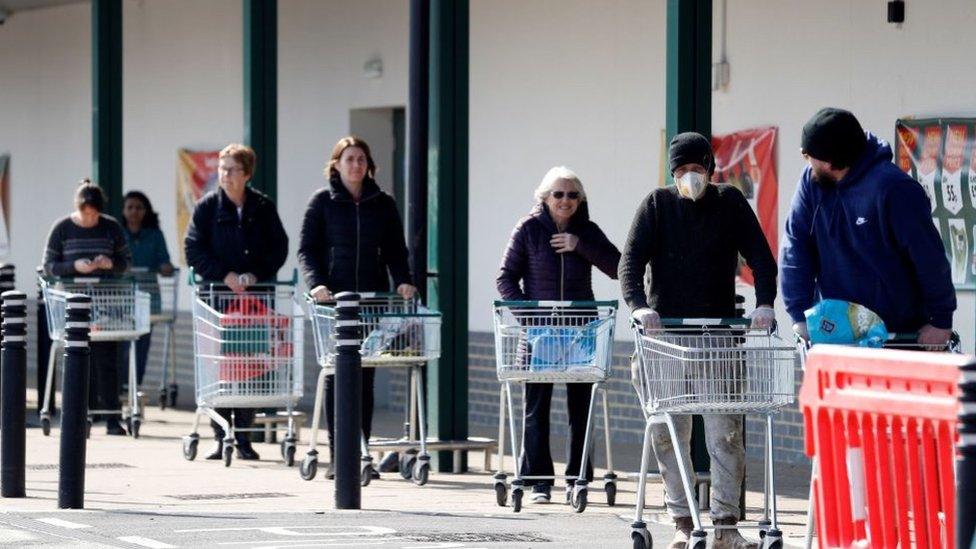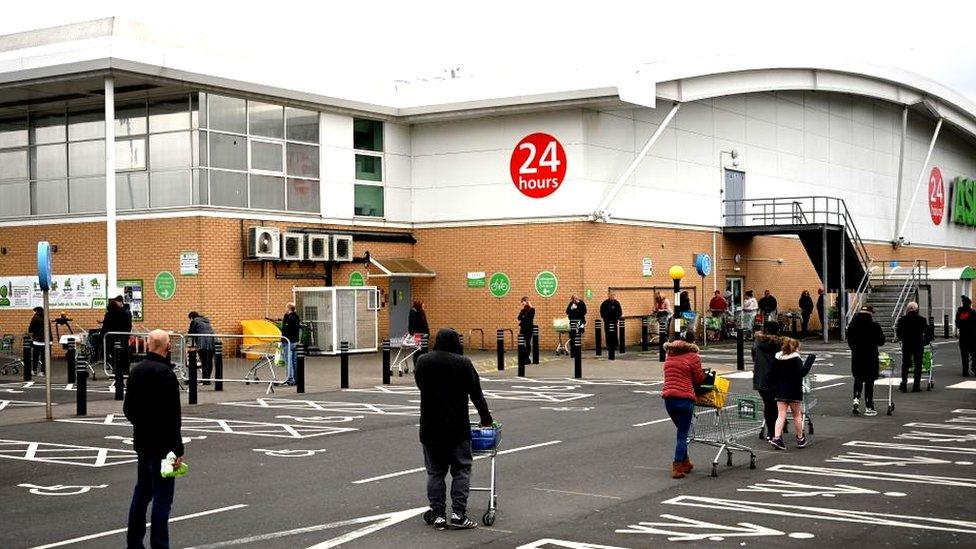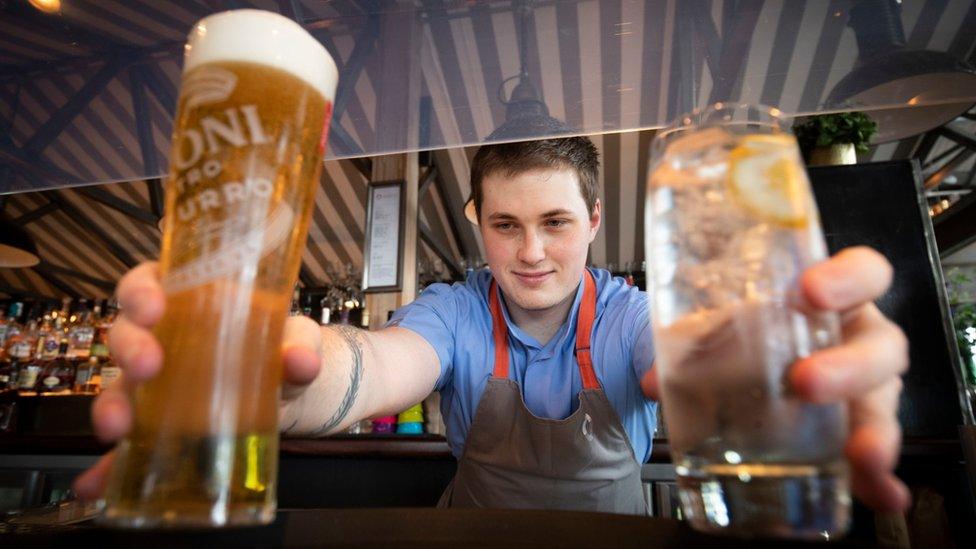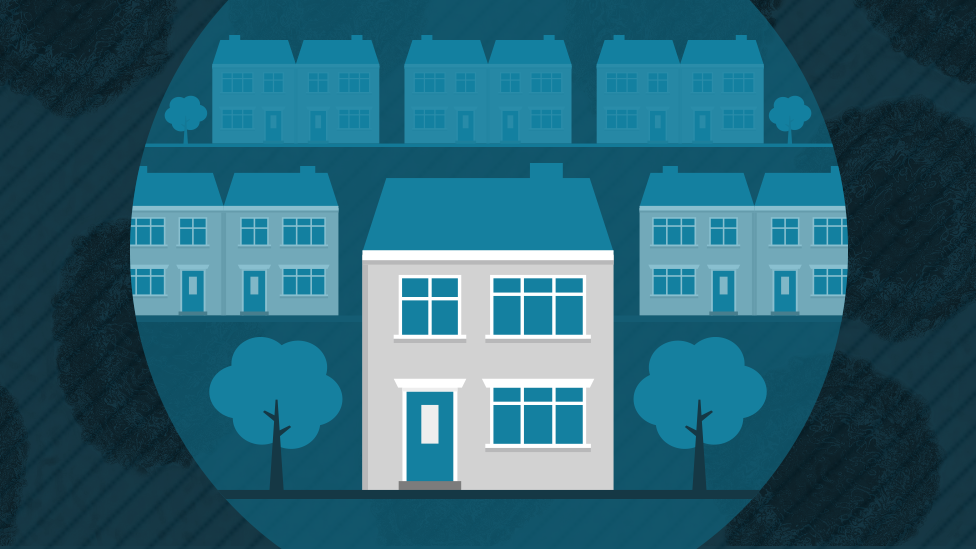Shoppers in Scotland warned of return to supermarket queues
- Published

Queues outside supermarkets were commonplace in the early weeks of lockdown
Stricter rules to halt coronavirus in Scotland could result in a reintroduction of supermarket queues.
The deputy first minister and the national clinical director indicated that the measure adopted in early lockdown might be necessary again.
John Swinney and Jason Leitch said the two metre rule, one-way systems, trolley cleaning and queuing would be part of a bid to "re-engage retail".
Shops union Usdaw urged customers to "play their part" and "be patient".
Speaking on the BBC's Mornings with Stephen Jardine, Mr Leitch said: "Retail did a great job at the end of March. The mitigations were good but we are a bit worried some of us have dropped our guard.
"We want to spend the next 16 days making sure the sectors re-engage again and make sure the guidance is robust so we can keep these areas open."
'Not going away'
He said his priority was to make these areas as safe as possible.
Mr Leitch explained: "That is why we are asking them to go back to two metre physical distancing and one way systems.
"It will mean a bit of queuing outside again, maybe the Covid officers helping with some of that. We need people to realise the virus is the same and it is not going away."
In the Scottish Parliament on Wednesday, First Minister Nicola Sturgeon announced the latest restrictions designed to stop the spread of infection.
New rules have been introduced for the hospitality sector, with the tightest restrictions set to affect 3.4 million people living in the central belt.
In central Scotland where the infection rate is highest, pubs and restaurants will close for more than two weeks. For the rest of the country venues will not be allowed to sell alcohol indoors, and must shut by 18:00.

Supermarkets have remained opened throughout the pandemic but most had reduced opening hours at the beginning of lockdown
The 16-day restriction period starts at 18:00 on Friday and the Scottish government said businesses would receive an additional £40m of government support.
Deputy First Minister Mr Swinney said on Thursday that the Scottish government had to take action to stop the opportunities for interaction where the virus could spread.
He said: "We do not want to get back to the situation where we have the virus as strong within our community as we had back in March."
The first minister's statement should serve as "a reminder" to the retail sector, added Mr Swinney.
He said: "Particularly we expect the two metre physical distancing to be put in place and I think it is pretty clear that some of the experience we all have in supermarkets, for example, where some of the stringent controls around queuing to get in, about washing down of trolleys, disinfecting trolleys, about ensuring that people are maintaining physical distancing within stores - many of these requirements have been relaxed."
'Be patient'
One supermarket chain, Morrisons, told the BBC that its outlets were already adhering to the Scottish government's social distancing requirements, but that it was providing other ways for people to receive their shopping without coming into the stores.
A spokesman said that one of those ways was expanding delivery service to more areas of Scotland.
Aldi said the "comprehensive safety measures" it put in place in stores at the start of the pandemic were still very much in place.
Sainsbury's said its restrictions had remained in place but that safety was its highest priority with stores continuing to follow government guidance. Greeters will be in operation outside stores.
The retail services union Usdaw urged the public to respect retail staff after the early part of the pandemic saw instances of abuse towards shop workers double.
They said abuse "was not part of the job".
The union's Scottish deputy divisional officer, Tracy Gilbert, said: "With infections rising we understand why the Scottish government wants to return to the original safety guidance for shops, that we developed with the Scottish Retail Consortium, to provide staff and customers with a safer shopping experience.
"Customers need to play their part and be patient, observe social distancing and show respect to shop workers. Retail staff are key workers delivering essential services and that role must be valued and respected."


- Published7 October 2020

- Published26 January 2022
